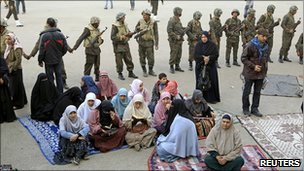 Egypt's army is trying to clear Cairo's Tahrir Square of protesters who have camped there for 20 days, vowing not to move until reforms are implemented.
Egypt's army is trying to clear Cairo's Tahrir Square of protesters who have camped there for 20 days, vowing not to move until reforms are implemented.
But several thousand have made their way to the square - the focal point of the uprising that led to President Hosni Mubarak's departure on Friday.
US President Obama has welcomed the new military leadership's pledge to work towards civilian rule.
It has reaffirmed Egypt's commitment to all its international treaties.
In a statement read out on state TV on Saturday, the army said it had asked the current government to stay on until a new one was formed.
Die-hard protesters
Sunday's influx of demonstrators came despite a plea by Egypt's military police chief for protesters to clear tents from the square and not to disrupt traffic.
"We do not want any protesters to sit in the square after today," said Mohamed Ibrahim Moustafa Ali, the head of military police.
The army seems undecided on how to respond to the fresh influx of protesters, the BBC's Jon Leyne reports from the scene.
Although there were reports of scuffles between soldiers and die-hard protesters in the square on Sunday morning, our correspondent said the operation to clear the area had previously been conducted unprovocatively.
A hardcore of several hundred protesters had remained marooned on a traffic island in the heart of the square, saying they would not move until a full timetable of reform was drawn up.
Throughout the weekend, an army of volunteers and municipal workers has cleared away debris from the streets.
Earlier, Mr Obama "welcomed the Supreme Council of the Armed Forces' announcement today that it is committed to a democratic civilian transition, and will stand by Egypt's international obligations," a statement released by the White House said.
The announcement, which was read by a senior officer on state TV, implicitly confirms that the country's 1979 peace treaty with Israel will remain intact.
Israeli PM Benjamin Netanyahu also welcomed the announcement, saying the treaty was a cornerstone of Middle East stability.
Meanwhile the authorities banned three senior officials close to Mr Mubarak - former Prime Minister Ahmed Nazif, former Interior Minister Habib al-Adli and current Information Minister Anas al-Fekky - from foreign travel, saying they were under investigation.
Mr Mubarak resigned on Friday after 18 days of protests, being flown to his luxury residence in the Red Sea resort of Sharm el-Sheikh having handed power to the high command, a body composed of high-ranking generals.
'Return to normal'
The military statement said the current government and regional governors would "act as caretakers", looking to guarantee "a peaceful transition of authority in a free democratic framework which allows an elected civilian authority to rule the country, to build a free democratic country".
Later state media reported that the high command's leader, Mohamed Hussein Tantawi, had met Prime Minister Ahmed Shafiq and other senior officials to discuss "the immediate return of life to normality".
He discussed with Interior Minister Mahmoud Wagdy the rapid return to duty of the police, who left the streets in the early days of the protests, reports said.
The police force in Egypt was widely perceived as an instrument of repression under Mr Mubarak.
The military has managed to give the impression of being above politics, a unifying force for the nation, but the opposition wants an early and clear indication that this country is heading in a new direction and not simply swapping one dictatorship for another, says our correspondent.
The demonstrations were triggered by widespread unrest over unemployment, poverty and corruption.



